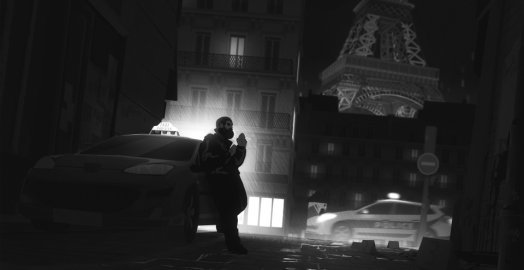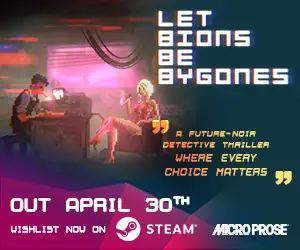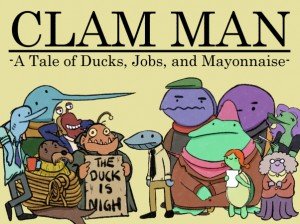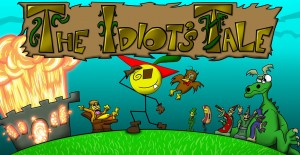Review for Night Call

Presumably anyone reading this has, at some point in their life, taken a ride in a traditional taxicab or a modern rideshare service. Having established that, admit it: at some point during the trip you thought this must be a cool gig. It would be fun to drive a car for a living, meeting all varieties of people and hearing all types of stories while serving such an important purpose in taking them to their destinations. Night Call is a noir-tinged visual novel/sim hybrid that wants to reassure you that yes, such a job is exactly as interesting and odd as you might think, and perhaps much more. It just may not make for the best gaming experience you can have.
The debut offering from French studio MonkeyMoon casts you as Houssine, an Arab immigrant driving a taxi in Paris. His backstory is not essential to the game; you learn that he has survived a recent assault and may have a complicated history with local law enforcement, but for now he’s just trying to make an honest living as a cabbie. The game portrays a 2D street map of the city and populates it with small pictures of the passengers available for you to pick up. Based on your vehicle’s current position, you can click any of them to drive your car to their position and pick them up. Only after you arrive are the passenger's destination and total fare revealed. Accepting moves you into the more substantial visual novel portion of the game: conversing with the passenger.
Your customers truly run the gamut of weirdness. During my first ten pick-ups, I met an apparent time-traveler, Santa Claus, a pair of teenagers in the middle of finishing a D&D-style live roleplaying game, and a cat who couldn't talk but seemed to know exactly where he wanted to go. I met many other more serious slices of Parisian life as well, including sufferers of family abuse, victims of racism, and emotionally downtrodden individuals badly in need of a stranger’s encouragement. There are also angry police detectives, doubtful and over-sharing priests, and of course obnoxious drunks.
Many passengers are eager to gab, and you can oblige them with responses or quietly let them fill the silence themselves. On the other hand, some are not in a talking mood and you can respect their desire for quiet, or insist on attempting to chat. These interactions are handled through dialogue trees, usually presenting you with 3-4 options, one of which is almost always silence or a smile or nod. It often takes a while to reach the next opportunity to branch into another topic; the majority of time you are simply reading.
In between assignments is an attempt to simulate the actual business of running a taxi. When you arrive to pick up the passenger you’ve selected and are shown their route and the projected fare, you’re given the opportunity to decline—maybe they need to go all the way to the other side of the city and you’d rather stick to short routes; or conversely, perhaps you feel like you need a big fare so you’re looking for a high-mile, big-dollar passenger. Each night’s shift has a limited timeframe and the minutes tick by as you’re driving, but time isn’t the only precious resource. Your taxi can run out of gas and before running out you must refill by clicking on preset gas stations on the world map.
Unfortunately the entire sim aspect is poorly handled, as you watch how much of each fare is eaten up by gas and your employer’s cut and realize that it’s essentially impossible to avoid losing money each and every night. The “decision” of whether to accept any specific passenger doesn’t seem like much of a choice because I could never figure out a reason why I wouldn’t just want to grab the closest fare to my current position. The only positive about the resource management is that it’s rather easy to ignore, because the over-arching story will usually play out before your funds have completely dwindled (which leads to you being fired and the game ending).
The narrative framework is a serial killer mystery, or rather a series of them; you can select from three cases with varying difficulty levels, none of which I found particularly distinct. Each is set up by an encounter with a police officer who convinces you—through some questionable, borderline abusive means—to be an unofficial liaison to the police, keeping your ears peeled for clues. These clues mostly come about in the natural course of conversation with your customers. More than half of all passenger interactions don’t have any connection to the mystery, however, so don’t get your hopes up that any given person is going to give you the breakthrough lead. When you do stumble onto a clue in the midst of an exchange (and I mean stumble, as there’s no skill involved in guiding the dialogue to the right place), you don’t need to be taking notes; you’re told it’s now automatically available in your clue repository.
Between the business of conducting passengers, there are some places of interest that pop up on the map out of nowhere which you can click to get a brief interaction, leading to another clue. In general I had no idea why, within the context of the story, I should know there would be a clue at any of these locations. And then when I got the clue, I didn’t fully understand it, but it went into the clue bank anyway. There may also be bits of intel on the radio (you can choose between multiple stations, though there is never varied background music, just text responses to your station choices) or in the local newspaper that you can buy at the gas station.
All this clue-finding culminates at the end of your day when you return home to a bulletin board where five completely random individuals have been selected as your virtual lineup, with their pictures on the board along with the whole mess of clues you’ve received and pins and strings to connect them. The clues that only fit with one of your suspects are automatically linked to that photo; the rest are left for you to move around and order, though you’re not able to physically connect them to just one suspect. The problem is that the clues are not only confusing and often not helpful, they can be entirely contradictory. Exactly how do I detect a killer when two of my clues are “Killer’s height > 1m80” and “Killer’s height < 1m70,” with no indication of where or from whom I got these clues and therefore whether one is more reliable than the other? When it comes time to guess the murderer, that is exactly what you’re going to do: guess. And, like me, you probably won’t care much whether you get it right or not because the stories have no momentum. The entire idea of solving the mystery is not as easy to ignore as the resource management; it’s an actively irritating distraction from the game’s biggest achievement.
That achievement is being one of the better-written conversation-focused games in recent memory. Not only has MonkeyMoon crafted a strange and diverse cast to interact with, it’s rather remarkable how much unique personality each of the characters is endowed with, communicated through little more than text. Assessing the “quality” of dialogue is often tricky in a game, but the characters here speak authentically and with genuine flavor, always believable and relatable. And they are surprisingly memorable because they are all given backstories that take a step past the “I’m tired of my spouse” or “man I had too much to drink” tropes you might expect. Instead there’s a nice emotional discussion with a lesbian couple who just finished interviewing potential fathers for their desired child, and a really intriguing extended interaction where your male passenger desperately enlists your help in building an excuse-laden story for his late arrival at home. The conversations are often very funny, and sometimes absorbingly strange in an abstract sort of way (seriously, make sure you pick up the cat). Most impressively, each ride is completely distinct from the one before it. Every moment spent sharing dialogue with another passenger is the best part of Night Call—and every moment you’re not is just an unnecessary bridge to the next conversation.
Though the writing itself is a strength, there are frequent passenger interactions that just take too long. While the idea of helping two teenagers complete their roleplaying game is a clever one, it goes on and on with no way to accelerate to completion, leaving you pleading for some type of option to short-circuit the rest of the conversation and get on with the night instead of clicking all the way through to the end. The script is also clearly attempting to convey subtle (or sometimes brutally non-subtle) social commentary, mostly regarding your experience as an Arab cab driver under constant suspicion in an area hit by a recent terrorist attack. The initial encounter with the female police detective who strong-arms you into helping with the investigation is a rather painful caricature of “angry cop lady,” and the narrative sometimes doesn’t seem aware that when Houssine internally asserts a rather quick judgment of one of your passengers as a likely racist or xenophobe, he (and therefore you) may be just as guilty of prejudice as you suspect them to be. I certainly would hate to have a cab driver who, within two spoken sentences, thought he had my beliefs neatly pegged based on my appearance and dialect.
Night Call does not strive to be technically impressive in any area. There is no voice acting, very limited sound, and the music is moody ambient electronica, looping and meandering without many points of impact. The hand-painted visuals are entirely in black and white, and almost all of your time is spent looking at the same shot of Houssine in the driver’s seat and your current passenger in the back seat behind him. Though the changing scenery animates appropriately through the rear window, the characters do little other than blink and occasionally move their heads between a few set positions; their mouths remain frozen throughout. There are some stylish shots of the cityscape as you drive around, but otherwise it’s a rather boring experience both to look at and to listen to.
Each case, consisting of five nights, is likely to take 4-5 hours, but achievement hounds will find this game to be exhausting. Not only does your Passidex show you all 75 possible passengers (of which one will arbitrarily be the killer and may be just a casual customer in the next story), but for some people you’ll discover that you managed to unlock less than half of the potential interactions—and since the distribution of fares is totally random, it’s not like you can easily go find the ones you missed or look for a do-over. You just have to hope that if you want to find someone specific, they pop up nearby and that you’ve got enough time left and gas in your car to pick them up. You’re certainly not going to meet all the passengers in one case, since you are limited to 4-5 rides per shift, and it’s very likely you’ll finish all three cases with at least 25% of passengers not yet revealed.
If a visual novel that is 90% about reading dialogue, well over half of which has absolutely no bearing on the larger story arc, does not appeal to you then you can feel free to keep on driving past this game. I was personally more intrigued by the potential investigative aspect, but Night Call fails pretty dramatically as a compelling mystery, and the irritating resource management aspects do not add much to the experience. Where it does succeed is as a moodier, and less carnal, interactive version of the popular HBO show Taxicab Confessions, not a visual novel so much as a neo-noir visual play. It’s fascinatingly weird and abstract—and it may be your only chance this year to simulate driving around a city with Santa Claus in your backseat. That’s more interesting than guessing a randomized serial killer’s identity any day.





_capsule_fog__medium.png)
























